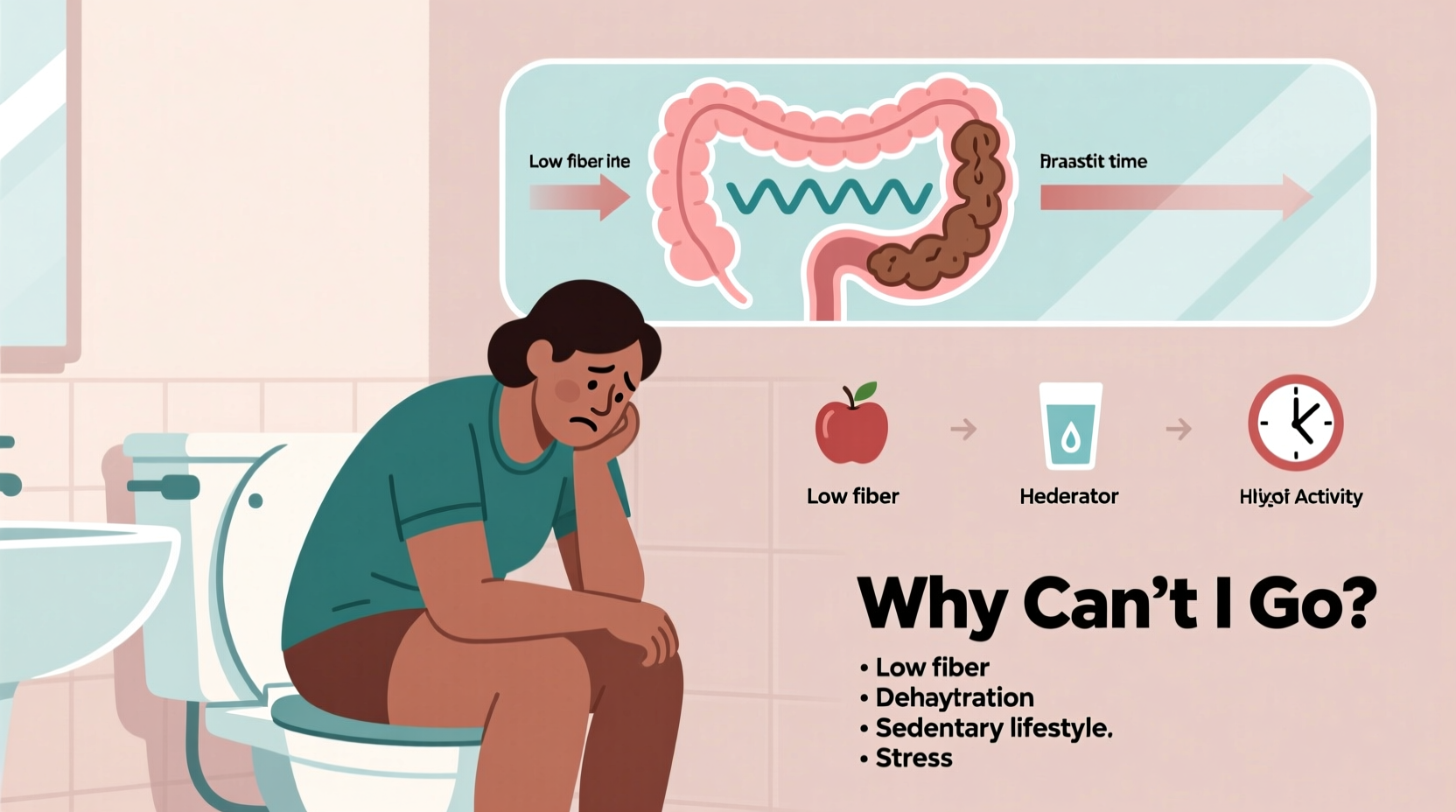Constipation is more than just an occasional inconvenience—it’s a widespread digestive issue affecting millions of people worldwide. If you’ve ever found yourself asking, “Why can’t I go to the bathroom?” you’re not alone. While it may seem like a minor discomfort, chronic constipation can significantly impact quality of life, energy levels, and even mental well-being. The good news is that most cases are preventable and treatable with lifestyle adjustments, dietary changes, and awareness of underlying triggers.
This article explores the science behind constipation, identifies common causes, and provides practical, evidence-based solutions to help restore regular bowel movements and improve digestive health.
What Exactly Is Constipation?

Medically, constipation is defined as having fewer than three bowel movements per week. However, frequency isn’t the only factor. Symptoms include hard or lumpy stools, straining during bowel movements, a sensation of incomplete evacuation, and bloating. Some individuals may go days without needing to use the bathroom, while others may feel the urge but be unable to pass stool.
The digestive system relies on coordinated muscle contractions—known as peristalsis—to move waste through the colon. When this process slows down, water is reabsorbed from the stool, making it dry and difficult to pass. This slowdown can stem from a variety of physical, behavioral, and medical factors.
Common Causes of Constipation
Understanding why constipation occurs is the first step toward resolving it. Below are the most frequent contributors:
- Diet low in fiber: Fiber adds bulk to stool and helps it move smoothly through the intestines. Diets high in processed foods and low in fruits, vegetables, and whole grains often lead to sluggish digestion.
- Inadequate hydration: Water softens stool. Without enough fluids, especially when consuming fiber, stools become hard and difficult to pass.
- Lack of physical activity: Exercise stimulates intestinal contractions. Sedentary lifestyles, particularly among older adults or those with limited mobility, increase constipation risk.
- Meds and supplements: Certain medications—including opioids, antacids with aluminum or calcium, antidepressants, iron supplements, and some blood pressure drugs—can slow bowel function.
- Ignoring the urge: Habitually suppressing the need to defecate disrupts the body’s natural reflexes and weakens signals over time.
- Stress and anxiety: The gut-brain axis means emotional stress can directly affect digestion, leading to slowed transit time.
- Medical conditions: Irritable bowel syndrome (IBS), hypothyroidism, diabetes, Parkinson’s disease, and pelvic floor dysfunction can all contribute.
“Chronic constipation is rarely due to one single cause. It’s usually a combination of lifestyle habits, diet, and sometimes underlying health issues.” — Dr. Linda Park, Gastroenterologist
Natural Remedies and Lifestyle Adjustments
Before turning to laxatives or medication, many people find relief through simple, sustainable changes. These strategies support long-term digestive health rather than offering temporary fixes.
1. Increase Dietary Fiber Gradually
Fiber comes in two forms: soluble (dissolves in water, forming a gel) and insoluble (adds bulk). Both are important. Good sources include oats, beans, lentils, apples, pears, broccoli, carrots, and whole grains.
Start slowly—adding too much fiber too quickly can cause gas and bloating. Aim for 25–30 grams daily, spread across meals.
2. Stay Hydrated
Drink at least 6–8 glasses of water daily. Herbal teas and clear broths also contribute to fluid intake. Limit diuretics like coffee and alcohol, which can dehydrate.
3. Move Your Body
Even light exercise such as walking, yoga, or stretching can stimulate intestinal motility. A 20–30 minute walk after meals may aid digestion.
4. Establish a Routine
Try to go to the bathroom at the same time each day, ideally 15–45 minutes after breakfast. This takes advantage of the gastrocolic reflex—the natural increase in colon activity after eating.
Do’s and Don’ts of Managing Constipation
| Do’s | Don’ts |
|---|---|
| Eat fiber-rich foods like prunes, kiwi, flaxseeds, and chia seeds | Overconsume dairy or red meat, which can slow digestion |
| Drink plenty of water throughout the day | Defer bowel movements repeatedly |
| Exercise regularly—even gentle movement helps | Rely on stimulant laxatives long-term without medical guidance |
| Use magnesium-rich foods or supplements (with doctor approval) | Ignore persistent symptoms lasting more than three weeks |
When to Seek Medical Help
Occasional constipation is normal, but certain red flags warrant professional evaluation:
- Symptoms lasting longer than three weeks despite lifestyle changes
- Unintentional weight loss
- Blood in the stool
- Severe abdominal pain or bloating
- A family history of colon cancer or inflammatory bowel disease
A healthcare provider may perform tests such as blood work, thyroid function tests, or imaging to rule out structural issues or systemic conditions. In some cases, a referral to a gastroenterologist or pelvic floor therapist may be necessary.
Mini Case Study: Recovering Regularity After Antibiotics
Sarah, a 34-year-old teacher, developed severe constipation after a two-week course of antibiotics for a sinus infection. She hadn’t changed her diet, but noticed she was drinking less water and skipping walks due to fatigue. Over two weeks, her bowel movements dropped from daily to once every five days, accompanied by bloating and discomfort.
After consulting her doctor, she learned that antibiotics had disrupted her gut microbiome, reducing beneficial bacteria essential for motility. Her treatment plan included a probiotic supplement, increased water intake, daily 20-minute walks, and adding ground flaxseed to her morning oatmeal. Within ten days, her digestion normalized. Sarah now prioritizes gut health after any antibiotic use.
Step-by-Step Guide to Relieving Constipation Naturally
- Assess your current habits: Track your diet, water intake, exercise, and bathroom patterns for three days.
- Add fiber gradually: Begin with one extra serving of vegetables or fruit per day. Try prunes or kiwi—they contain natural laxative compounds.
- Hydrate consistently: Set reminders to drink water, especially in the morning and after meals.
- Move daily: Walk, stretch, or practice yoga poses that target the abdomen (e.g., child’s pose, seated twist).
- Set a bathroom schedule: Sit on the toilet for 5–10 minutes after breakfast, even if you don’t feel the urge.
- Monitor progress: Keep a symptom journal. If no improvement in 10–14 days, consider a short-term fiber supplement like psyllium husk.
- Consult a professional: If unresolved, seek medical advice to rule out underlying conditions.
Frequently Asked Questions
Can stress really cause constipation?
Yes. Stress activates the sympathetic nervous system, which slows digestion. Chronic stress can impair gut motility and alter gut bacteria, contributing to constipation. Mindfulness practices, deep breathing, and regular sleep can help counteract these effects.
Are laxatives safe for long-term use?
Not all laxatives are the same. Bulk-forming laxatives (like psyllium) are generally safe for ongoing use. Stimulant laxatives (such as senna or bisacodyl) should only be used short-term, as prolonged use can lead to dependency and weakened bowel function.
Is it dangerous to go several days without a bowel movement?
While uncomfortable, going a few days without a bowel movement isn’t typically dangerous for healthy individuals. However, prolonged retention can lead to fecal impaction, especially in older adults or those with mobility issues. Persistent absence of bowel movements warrants medical evaluation.
Conclusion: Take Control of Your Digestive Health
Constipation is a common but often misunderstood condition. It’s not something you simply have to endure. By understanding the root causes—whether dietary, behavioral, or medical—you can take meaningful steps toward relief. Small changes in hydration, fiber intake, and daily routine often yield significant improvements. Most importantly, listen to your body and respond to its signals without delay.
If you’ve been struggling with irregular bowel movements, start today. Implement one or two of the strategies outlined here and observe how your body responds. Digestive wellness is a cornerstone of overall health, and regaining regularity can transform your comfort, energy, and confidence.









 浙公网安备
33010002000092号
浙公网安备
33010002000092号 浙B2-20120091-4
浙B2-20120091-4
Comments
No comments yet. Why don't you start the discussion?